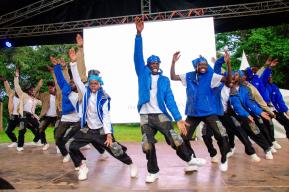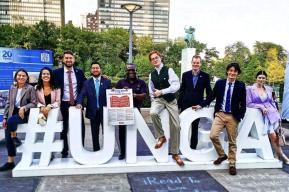As part of a series of seminars on “Not leaving anyone behind in the times of the COVID-19 pandemic”, we were overjoyed to welcome to our panel the leading choreographer Rossana Filomarino, director of Drama Danza, 2018 National Arts Laureate, and Emeritus Creator of the National Fund for Culture and the Arts (Mexico), who spoke to us about the transformations that culture, and specifically dance teaching, has been forced t o go through during the pandemic. She also shared a number of brief but profound reflections on the challenges that we face during this time of crisis, "which is leaving us orphaned and full of uncertainty; the world is upside down, but we dancers must stand up!" said Filomarino.
“In these times of confinement due to the pandemic, all teachers have turned their wisdom to the screen, learning how to use new technologies, changing methodologies to try to fit their classes to this new situation. However, a lack of space, a lack of presence, a lack of teamwork, a lack of being able to touch when correcting a pose, and many other etceteras mean that the resulting classes cannot be compared to classes given in a studio,” commented Filomarino, who stated that she believes that remote classes can be used to train, but not necessarily to achieve a teaching process.
The dance educator stated that much remains to be done before teaching and training can return to normalcy, so in the meantime, she suggests that "we should try to instill, even using remote techniques, the vital spirit of a class, where learning is based on observing my colleagues and not their absence, where being seen is understood as a manner of being together and not as an act of performance.”
During her talk, Filomarino spoke about what she has observed on social networks: young people sharing their concerns about movement in videos, generating "a global inundation of small solos, highlighting young people's overwhelming need for communication and an activity that takes them out of isolation." However, she stressed that most use movements that are currently in fashion, and the thematic innovation is minimal. "Most of these cases tried to use elements of known languages to express loneliness, confinement, anger, fear, and all those feelings stemming from the pandemic," but that there is a basic absence of thinking about others: "you don't do art for yourself, you do it to communicate with others."
Her suggestion is to use technology to seek out a new language, built on a deep-rooted emotion or idea that we need to share in order to travel new pathways; “I think it is very important, both for choreography as a creative art and for teaching, to take these new pathways and not to use the screen to reproduce what has already been done,” and to “eliminate mistrust towards others and be able to create resilience to this terrible situation we are living through.”
In definitive terms, the message that Rossana Filomarino leaves us with is that “the key is to transform, not to adapt,” so that art continues to be a driving force for society’s development that allows us to “invent new pathways built on absence, but absence laden with presence, filled with life.”
What is the power of culture for education in times of crisis?
The impact of social distancing and isolation on mental health is well-known (loneliness, tension, and anxiety), and this may be prolonged and debilitating if children and students are constantly exposed to the tensions of confinement and the fear of illnesses. However, culture and the arts have played a vital role in giving learning objectives a sense of pertinence during the COVID-19 crisis.
Greater integration of culture, heritage, and the arts into educational responses to COVID-19 with the objective of maintaining interest, motivation, and commitment to learning during and after lockdown will be positive. Here, UNESCO Santiago Associate Culture Programme Coordinator Nicolas del Valle stressed the importance of "implementing education policies that sustainably integrate the wide-ranging manifestations of culture to best prepare future generations and strengthen their resilience and recovery capacity. Creativity, culture and the arts can help students prepare themselves for life after COVID-19."
Mobilizing the cultural sector in support of the shared human values of respect for diversity, pluralism, dignity, solidarity, gender equality, human rights, and the rule of law is necessary to make a positive response to the challenges brought about by the crisis. This includes promoting critical thinking about the COVID-19 crisis and its impact on democracy, social issues, and rights.










